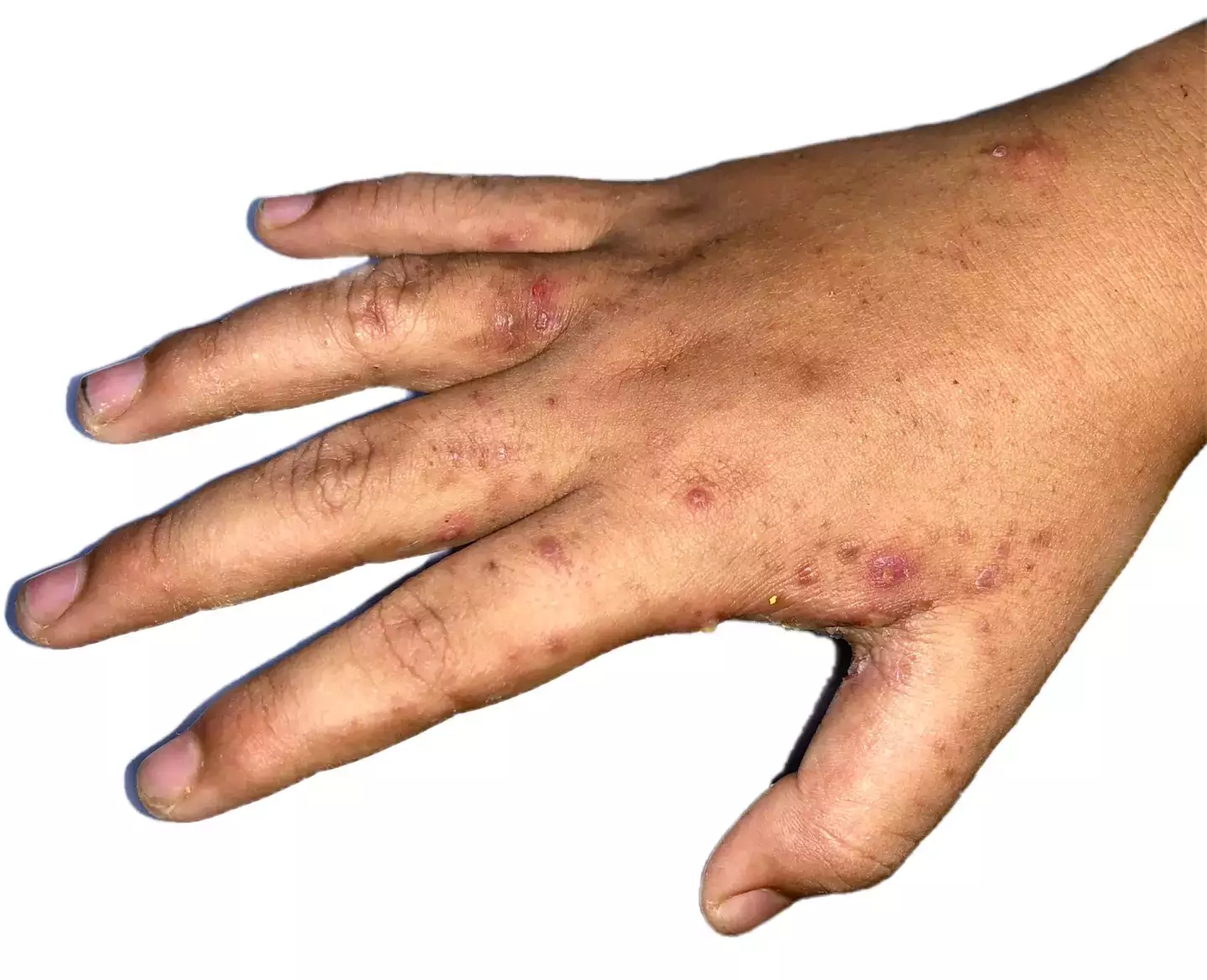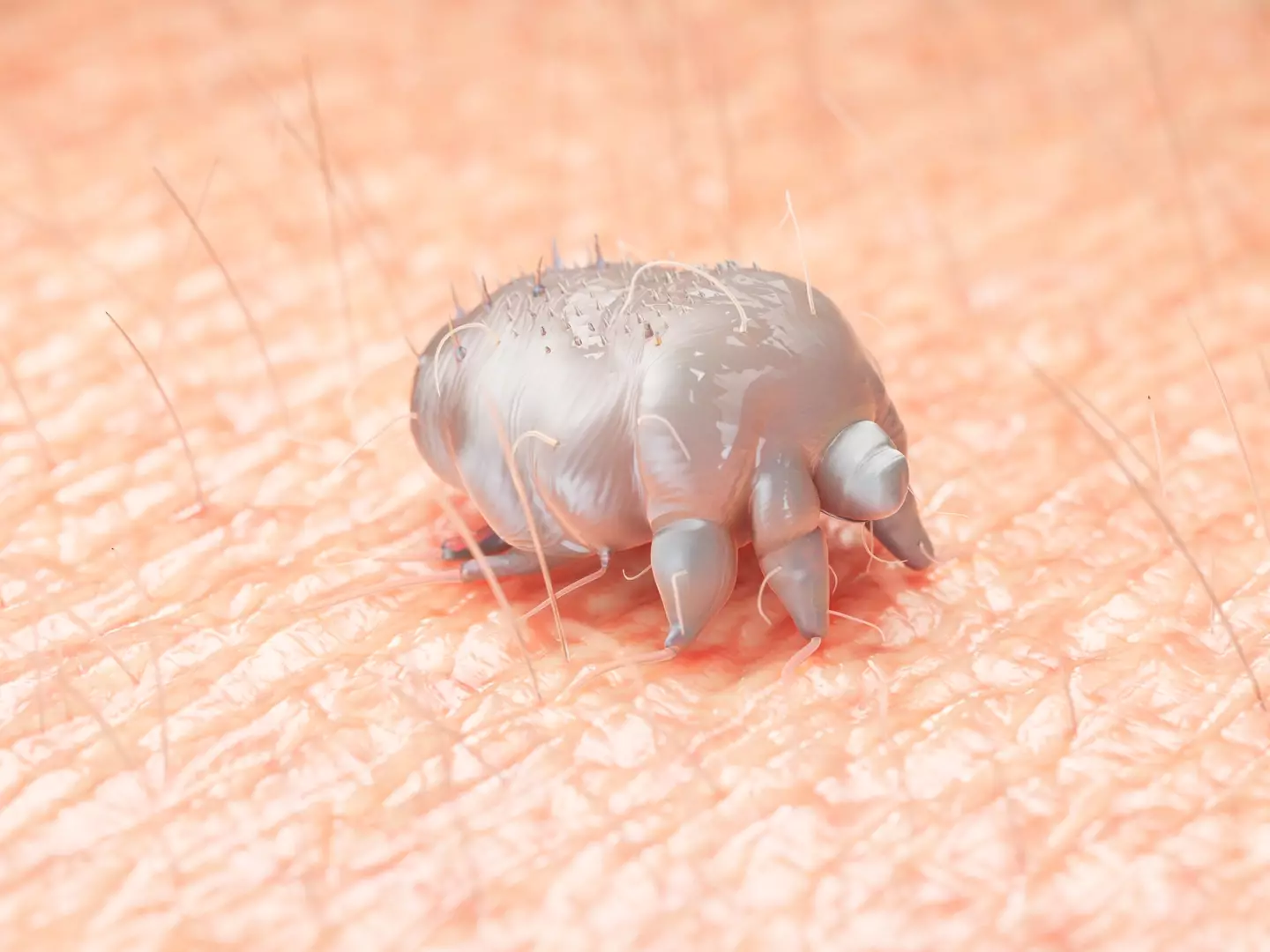But this year, we’re at risk from other horrible things that are looking to set up shop in our bodies.
It’s not that they don’t exist all year round. It is more a case of these infections are returning and in stronger numbers than modern society has ever really seen.
Enter the world of Victorian diseases, which are making a name for themselves in 2024.

Cuts on a persons hand; usually a sign of a scabies infection (Getty Stock Images)
Known for being untreatable killer infections up until the early 20th century, they were once commonplace if you were from an impoverished and malnourished background.
But while we thought we’d called a day on most of these infections – we’re talking the likes of syphilis, scabies and scurvy – due to the advances of modern medicine, they are spreading across the UK in a way that hasn’t been seen for some time.
Victorian diseases return
GPs in the UK have in recent weeks been warning Brits about symptoms of scabies – a disease usually associated with Victorian workhouses – as the infection spreads across the UK; particularly in northern England.
Scabies is where parasitic mites burrow in the skin of a person before laying eggs, with their track marks and eggs visible to the naked eye and looking like tiny cuts. And while it is easily treated, it can end up being life threatening if you have scabies and do not treat it, with it potentially causing secondary infections.

The syphilis bacteria up close (Getty Stock Images)
Professor Kamila Hawthorne, the chairwoman of the Royal College of GPs, said: “While not a serious condition, scabies can be very itchy and irritating.
“If not properly treated, it can spread and increase a patient’s risk of complications, such as secondary skin infections or make existing skin conditions worse.”
Why are Victorian diseases spreading in the UK?
Last weekend, the British Association of Dermatologists issued a rather rare alert for the ‘unusually high’ rate of scabies. It came days after a similar warning for scurvy, with people developing the condition due to a lack of fruit and vegetables in their diet.
And The Sunday Times reports that cases of the sexually transmitted disease syphilis are at there worst since 1948.
All in all, it paints a pretty grim picture for UK public health.
Dr Tess McPherson, of the British Association of Dermatologists, said scabies could be put down to a few important factors – mixing at the beginning of the university year, slow treatment once symptoms develop and not isolating after noticing symptoms.

CGI of a parasitic mite beginning to burrow into a person’s skin (Getty Stock Image)
“The surge in cases that we saw in September may in part be explained by students returning to university, with cases spreading through halls of residence,” she said.
“If even one person in a group doesn’t treat, then reinfection can easily occur, and scabies can continue to spread. Treatments are available for scabies both over the counter and through GP, but they need to be used as instructed to ensure they work.
“While we don’t know for certain what is driving the number of cases up, this has been something we have been seeing for the last few years. Factors in the ongoing infestations seem to be delays in diagnosis, delays in beginning treatment, and not using treatments to full effect, which can lead to reinfection.”
On the spread of syphilis and other STIs, chief medical officer Professor Sir Chris Whitty said a fall in public funding was making the situation worse, saying syphilis is a ‘very dangerous disease with multiple complications’.
Featured Image Credit: Getty Stock Images
Topics: Health, UK News, Sex and Relationships

A doctor has explained why he thinks the ‘winter vomiting bug’ is sweeping across the United Kingdom ahead of the colder, dark months.
The highly contagious norovirus is making its way across the UK, with cases far higher than normal for this time of year.
So far this autumn, cases are 30 percent higher than usual for the two week period in to the start of October.
In real terms, that means we are seeing 100 percent more infections than normal for this time of the year.

We’ve all been there (Getty Stock Images)
Norovirus is called the winter vomiting bug because, well, it does just that. You’re likely to get pretty sick, and if you’re lucky enough to avoid that, you could be left feeling incredibly nauseous.
You’re also likely to have a nasty case of diarrhoea, with headaches and arm and leg aches also really common across the board.
But why is it spreading? LADbible spoke to one doctor who gave us his thoughts.
Why is norovirus spreading in the UK?
Speaking to Dr Ramit Singh Sambyal, a doctor and general physician who works with ClinicSpots, LADbible asked why cases are spreading more than normal for a standard autumnal season.
For Dr Sambyal, there are a number of factors that could be at play, with some of them going back to the Covid pandemic.
“There are a few reasons why norovirus cases might be spiking earlier than expected,” Dr Sambyal said.

Having norovirus is horrible (Getty Stock Images)
“For one, we’re seeing an increase in person-to-person contact now that most COVID-related restrictions are behind us. More gatherings, more indoor activities, and people spending more time together in close quarters all contribute to higher transmission rates.”
Dr Sambyal added: “Another factor could be the natural seasonal pattern of norovirus. While it’s most common in the winter months, it’s not unusual to see cases start rising in autumn. The virus thrives in cooler weather when people spend more time indoors, and ventilation isn’t as good, making it easier for the virus to spread.
“Interestingly, there’s a lesser-known theory that the pandemic may have disrupted normal viral patterns.
“With lockdowns and social distancing, norovirus cases were abnormally low for a couple of years. Now, as normal life resumes, our collective immunity may have weakened slightly, allowing the virus to spread more easily this season.”

Norovirus close up under a microscope (BSIP/UIG Via Getty Images)
Should I be worried about norovirus?
Dr Sambyal explains that while norovirus makes you sick, there is usually not much danger beyond being under the weather if you’re fit and healthy. You kind of just have to ride out the storm.
The main thing to worry about is dehydration, with people losing a lot of fluids through the symptoms of getting the winter vomiting bug.
“Dehydration that can result from the fluid loss is something to keep an eye on, particularly in young children, the elderly, and people with weakened immune systems,” the doctor explains.
Featured Image Credit: Getty Stock Images
Topics: Health, Originals, Science

Doctors in the United Kingdom are warning people not to ignore ‘tiny red dots’ that could spring up across their hands- and if they do, stay away from others while seeking help.
It is the latest health warning in the UK in the last few weeks, with cases up 100 percent when it comes to another brutal illness that is leaving people with horrible symptoms including being sick, suffering from diarrhoea, aches in your limbs, and headaches.

A child with scabies (Getty Stock Images)
What are doctors warning Brits about?
It’s all due to scabies, with GPs warning patients about it spreading across the UK.
In particular, there are outbreaks in northern England, where doctors say they are seeing a spike in cases.
“While not a serious condition, scabies can be very itchy and irritating,” says Professor Kamila Hawthorne, the chairwoman of the Royal College of GPs.
“If not properly treated, it can spread and increase a patient’s risk of complications, such as secondary skin infections or make existing skin conditions worse.”

Scabies can appear anywhere (Getty Stock Images)
What is scabies and what are the symptoms?
Scabies is an infectious disease caused by mites burrowing under your skin.
They tunnel in the layers of your skin, laying eggs, which you will be able to see with your naked eye.
It is easily spread by people who physically come into contact with each other, and the rashes caused by the mites can spread across the entire body.
You’re likely to have scabies if you find you’ve got intense spells of itching, especially at night. Rashes and spots are also common.
One university student told the BBC she had started to get ‘tiny red dots’ around her wrists and hands.
How can I catch scabies?
Scabies is incredibly common in schools and young adults, given how much they mix with other people.
It can also be caught if you have multiple sexual partners, given how close you’re getting to others in such a setting.
Sharing bedding is also an easy way to catch it; the same goes for clothes.
If you catch scabies, you should wash all your bedding and clothes in 60-degree Celsius water.
If it can’t be washed at such a high temperature, seal it in a bag for three days so as to kill all the mites.

An illustration of what the mites are doing when they burrow under your skin (Getty Stock Images)
‘Don’t hide away if you have scabies’
Prof Hawthorne has urged people to get the help they might need if they think they are suffering from scabies.
There is a ‘social stigma’ surrounding the disease, but it shouldn’t prevent infected people from seeking the help they might need
It is incredibly uncomfortable, and there are creams and lotions that you can access to alleviate symptoms. As well as this, the infections could lead to something worse if the bites get worse.
“We recognise that patients may be apprehensive to seek treatment given the social stigma that surrounds the condition, but it is important that they don’t ignore their symptoms as this could lead to them getting worse and risks transmitting the condition to other people,” she said.
Featured Image Credit: Getty Stock Images
Topics: Health, UK News

It’s the latest in a creeping crackdown on vaping and smoking from politicians running the country, with former prime minister Rishi Sunak getting the ball rolling.
His successor, Sir Keir Starmer, has continued the hardline approach to improve the health of people in the country and relieve pressure on the NHS, he has previously said.
Last month, Starmer’s government confirmed it was continuing with Sunak’s smoking ban plans.
It means that those born after a particular year will never be legally allowed to purchase tobacco products.
A similar ban was suggested in relation to vaping, with reports also emerging that Starmer was looking to ban smoking in beer gardens.
Now, this morning (24 October), the UK Government has confirmed the ban on vaping will go ahead, with disposable products outlawed across the country.
Those who use refillable ones can continue to do so, as it’s seen as an important tool to get people to stop smoking.
At a recent press conference, Starmer said vaping is ‘a huge burden on the NHS, and, of course, it’s a burden on the taxpayer’.

They are being banned (Getty Stock Images)
“So, yes, we are going to take decisions in this space,” he said.
The Tobacco and Vapes Bill is the piece of legislation that will pave the way for both the smoking and now disposable vaping ban.
Outside of relieving the burden on the NHS, health minister Andrew Gwynne revealed one ‘deeply worrying’ reason behind the ban.

Vaping will be outlawed if you don’t use the refillable versions (Getty Stock Images)
“It’s deeply worrying that a quarter of 11 to 15-year-olds used a vape last year and we know disposables are the product of choice for the majority of kids vaping today,” he revealed.
“Banning disposable vapes will not only protect the environment, but importantly reduce the appeal of vapes to children and keep them out of the hands of vulnerable young people.
“The government will also introduce the Tobacco and Vapes Bill – the biggest public health intervention in a generation – which will protect young people from becoming hooked on nicotine and pave the way for a smoke-free UK.”
Libby Peake, head of resources at Green Alliance, said: “Disposable vapes are the last thing our children and the planet need, and for too long the market for them has been allowed to grow unchecked.”
Under the bill, smoking will be banned for everyone born after 1 January, 2009.
It won’t be illegal to smoke; rather, you just won’t be allowed to purchase tobacco products, and businesses will be prosecuted for selling to those born after this date, the government has said.
The ban on disposable vapes will come in to force from 1 June, 2025.
Featured Image Credit: Getty Stock Images / Peter Dazeley / Getty Images
Topics: Vaping, Health, UK News, NHS, Keir Starmer

Unless you want your knobbly knees knocking together as you freeze in the colder temperatures it’s time to wear pants that actually make it down to your ankles – unless, of course, you’re a postie.
Come rain, shine, snow or hail these veritable terminators of letter delivery will be marching from door to door clad in shorts, the vital legs which carry them about the country so they can deliver letters exposed to the elements.
Ok, you will see some of them wearing trousers, but plenty of posties are still out in shorts long into the months when everyone else has put their shorts away.
It might seem a tad baffling to the rest of us, why postmen and postwomen don shorts to tackle their routes each day.

The cold weather is nothing compared to the power of a postman’s shorts (MI News/NurPhoto via Getty Images)
Fortunately, some inquisitive Brits have had this very question on their minds and took to Reddit to ask it, where postmen and postwomen both past and present came up with answers.
One particularly popular response said: “It really is just because it gets hot doing the job.
“One round I cover I wear trousers just because of the wind (made the mistake once and had windburn all up my legs) but it’s that particular village happens to be the highest point of the town and is a massive wind tunnel. All other rounds I’m in shorts pretty much all year.”
Another postie chimed in to say they ‘hate sweating’ and that ‘walking around all day used to make me sweat my balls off’ – hence the shorts.
They did add that in very extreme weather cases they might pop on the waterproofs, but another postie said that ‘skin is waterproof’ and ‘walking all day is hot work’.
That seems to be the prevailing opinion among the postie hivemind, walking around all day with everyone’s post is a cocktail to become marinated in your own sweat by the end of the shift, so wearing shorts helps keep the body cooler.

Big jacket up top, shorts and bare calves down below. (Patricia Hamilton/Getty Images)
It’s not hard to imagine that trousers which get sodden with rain would take longer to dry than just applying a towel to your legs.
You never really saw Postman Pat in shorts but he didn’t have to spend hours trudging around Greendale delivering to hundreds, if not thousands of addresses each day.
Another former Royal Mail employee said that posties would even make it interesting amongst themselves by setting challenges for who could last the longest in winter wearing shorts.
They explained that everyone would stick a quid in the pot each week and the winner got to donate it to their chosen charity.
Given that nobody wants to walk around until they’re more sweat than man, wearing shorts seems pretty understandable.
Featured Image Credit: Getty Stock Photo / Patricia Hamilton/Getty



